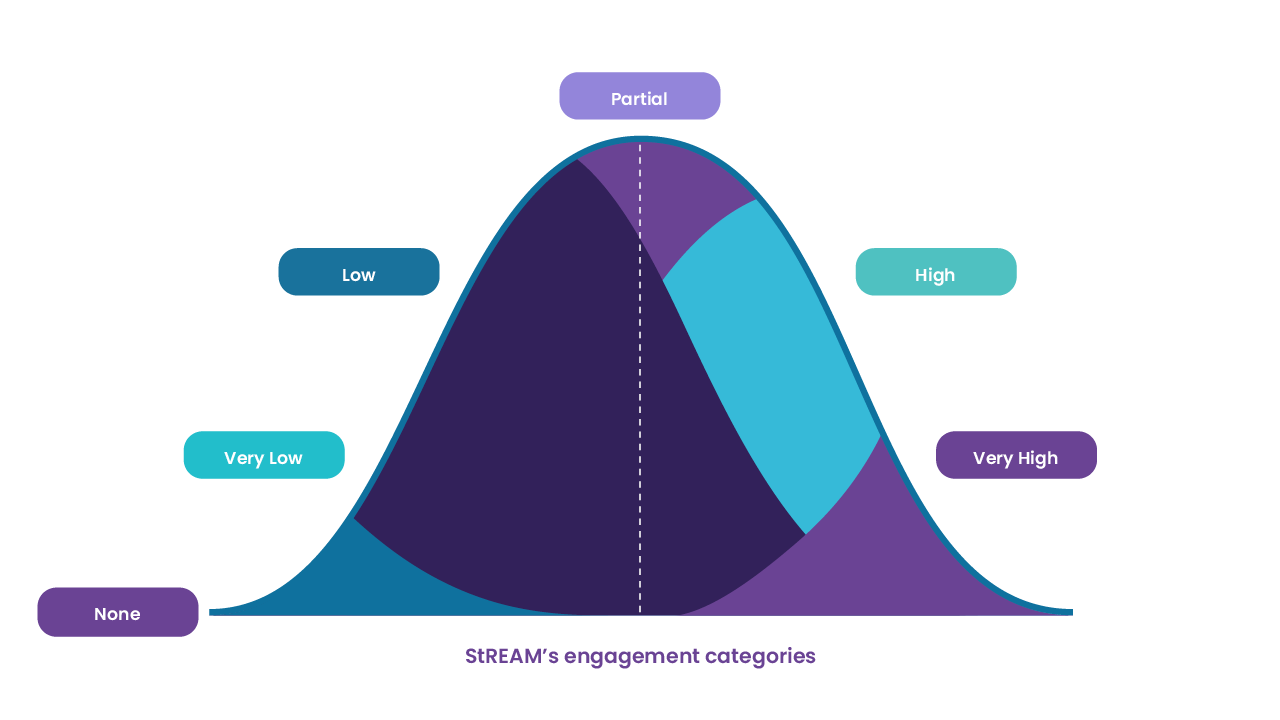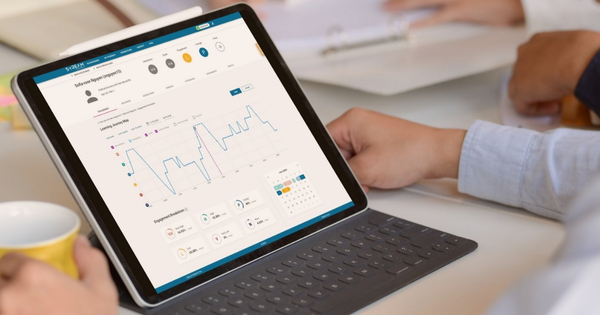Student engagement analytics offer numerous benefits for higher education institutions. Whether you’re seeking to improve student outcomes and retention, support struggling students or to better understand how students engage with their course in contemporary learning environments, engagement analytics provide numerous benefits that support wide range of institutional goals.
When it comes to implementing student engagement analytics, universities often consider the critical choice: whether to develop an in-house solution or invest in a comprehensive engagement analytics platform. Though often considered alternative solutions, these avenues are not always directly comparable, as whilst in-house solutions may offer basic data aggregation and reporting capabilities, they often fall short in providing actionable insights and real-time functionality that enables institutions to understand student engagement and impact outcomes.
A full engagement analytics platform like StREAM, however, does empower institutions with actionable insights that drive successful outcomes and can continuously evolve to meet the diverse needs and goals of higher education. Meticulously developed in partnership with the higher education sector, StREAM is also the only analytics platform that can effectively codify student engagement based on educationally purposeful activity and has been continuously proven to positively impact student outcomes at over 20 UK-based universities for over a decade, something in-house reports are yet to achieve.
So, when it comes to developing engagement analytics solutions, instead of developing an in-house (DIY) reporting mechanism, it might be time to call in the experts.
The benefits of choosing StREAM:
1. The codification of engagement
In-house solutions are often limited to data aggregation and reporting capabilities, requiring specialists to interpret, manipulate and communicate the data with relevant stakeholders. In-house solutions therefore will often analyse data retrospectively, meaning current students will not benefit and the solution isn’t particularly actionable.
StREAM goes beyond simple reporting with its unrivalled codification of engagement.
StREAM’s unique algorithm takes engagement data and – unlike traditional RAG (Red, Amber, Green) systems that provide a simplistic view – automatically codifies engagement into six distinct categories from ‘None’ to ‘Very High’, producing daily engagement scores for each individual student, meaning you have a true and complete picture of student engagement.

StREAM can also be tailored to each institution’s specific needs, utilising your data and weightings to create a bespoke engagement model that reflects your strategic priorities, but the biggest benefit to your institution is that StREAM’s algorithm stands out as a pioneering tool in predicting student risk.
2. Risk identification
Research shows that StREAM can predict student withdrawals with 90% accuracy, identifying at-risk students up to six weeks before they withdraw (NTU 2018)
StREAM’s engagement algorithm has been proven to accurately identify at-risk students in near real-time, enabling you to provide more timely support, and to scale that support across a whole institution. Unlike traditional methodologies that rely on attendance or demographic characteristics, our ethical approach focuses on engagement metrics and what students ‘do’ and not ‘who they are’, providing a more reliable and objective indicator of risk. StREAM also uses machine-learning to continuously learn from institutional data, enhancing its predictive capabilities and accuracy over time.
3. Improved student outcomes
StREAM’s ability to accurately identify students who may be at risk of withdrawing, a significant period before a student may go on to withdraw, and alert universities to these changes in engagement behaviours, has helped over 20 universities improve their student outcomes. Educators are empowered to use insights from StREAM to take action and intervene earlier, ensuring students most in need of support get the right support at the right time, and that no student needs to fall through the gaps. StREAM supports university staff to reach out to students, log interventions and make referrals to centralised support services where needed.
Using these methods, StREAM has been proven to positively impact an institution’s retention rate and financial stability by seamlessly identifying low engagers and enabling timely interventions and support so that students are less likely to leave their studies. Over a 4-year period, the University of Essex has seen a 68% reduction in withdrawal rates for low-engaging students using insights from StREAM (University of Essex, 2022). Keele University have also adopted a data-driven approach to student success using StREAM, seeing drop-out rates reduced from 6.4% to 3.4% in just one academic year, leading to a £100K positive financial difference.
The latest research from Keele University highlights that StREAM data shows that students with higher levels of engagement in their studies achieve better outcomes and that there is a strong correlation between student engagement and success.
4. Personalised learning
StREAM can be used to support every individual student’s success on their academic course. We define engagement through activities that are educationally purposeful for your university, such as accessing the Virtual Learning Environment (VLE) or borrowing library materials. By combining attendance data with other metrics for engagement like assessment results and lecture capture, StREAM provides a more holistic view of student engagement.
By being able to easily visualise student engagement in near real time, you can discover ways to enhance academic engagement and use data to tailor educational experiences to individual students’ needs, and support whole cohorts through identifying which learning resources are most effective for progress and attainment.
Here’s 10 ways StREAM can support teaching and learning >
5. Data-driven decision making
StREAM can also play a crucial role in supporting data-driven decision making in higher education. By analysing data on student interactions, participation, and performance, institutions can gain valuable insights into how students engage with their courses. This helps in informing curriculum development, ensuring that the content is relevant and meets the needs of the learners. Additionally, teaching strategies can be tailored based on evidence of what works best, enhancing the overall learning experience. Academic support models can also be refined to provide targeted assistance to students who need it most, thereby improving retention and success rates. Ultimately, leveraging data and evidence in these ways leads to more effective and responsive educational practices.
6. Scalability and resource optimisation
In adopting a data-driven approach to student success, universities can analyse engagement patterns and allocate resources more efficiently, ensuring that support is directed where it is most needed, allowing for the development of a whole-institution strategy to student support, fostering a more cohesive and effective learning environment – as discussed in our ‘From Support to Success’ white paper with Wonkhe. The in-built functionality of StREAM automates some of these processes for universities and allows for focused support where it is needed most, providing a scaleable solution that can maximise resource efficiencies.
The real-time insights and continuous updates from StREAM are also crucial for adapting to changing student needs. Constant development and feature upgrades on our platforms ensure StREAM remains relevant and capable of addressing emerging challenges, making them invaluable tools for optimising resources and scaling support services effectively. This leads to a more responsive and supportive educational experience for all students.
Call in our expertise
Adopting StREAM over an in-house reporting capability offers numerous advantages for your institution and student community and provided a quicker time-to-value than in-house solutions. With over a decade of experience in helping higher education achieve successful student outcomes using StREAM’s unique codification of engagement and strong accuracy in predicting risk, we’d love to chat to you about how StREAM can benefit your university.
Take the first steps today – book a demo of StREAM >
Want to reflect on some of the more operational considerations? Check out our ‘DIY engagement analytics: what you need to consider’ blog.











